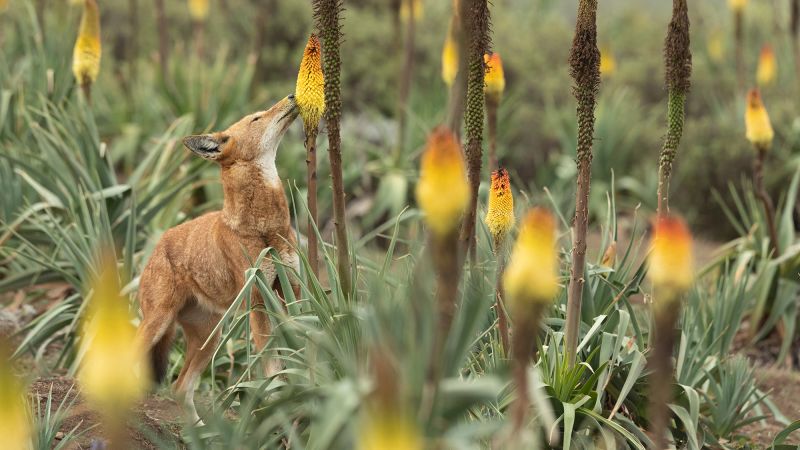In a remarkable discovery by biologist Claudio Sillero, it was observed that Ethiopian wolves, during his initial research trips to Ethiopia in the late 1980s, displayed an unusual behavior of licking the colorful flowers of the red hot poker plant prevalent in the highlands. This unexpected phenomenon has intrigued scientists, as there are very few documented cases of mammals consuming nectar. Sillero, now a professor of conservation biology at Oxford University, shared his surprise via email, noting that these carnivorous creatures seemed to enjoy a sweet treat, akin to dessert.
As the years progressed, scientists, including Sillero, continued to witness Ethiopian wolves engaging in this nectar-drinking behavior. However, it wasn’t until a recent publication in the journal *Ecology* that their actions were officially documented. The study, co-authored by Sillero, indicates that these wolves’ interaction with the red hot poker plant might extend beyond mere consumption, with implications suggesting they may play a role in pollination.
To understand the phenomenon in greater detail, Sillero and his colleagues studied six wolves from three packs over a span of four days, coinciding with the blooming season of the red hot poker plants from late May to early June. Each of the observed wolves engaged in licking the flowers, with the duration of their engagement ranging from one minute to an hour and a half. The research took place under the auspices of the Ethiopian Wolf Conservation Programme, established by Sillero in 1995, aimed at preserving this endangered species.
Ethiopian wolves primarily hunt small rodents; therefore, the nectar collected from the flowers acts as an extra source of energy, supplementing their primarily meat-based diet. This dietary behavior can be explained through what researchers call the “dessert hypothesis.” This theory posits that species may indulge in an additional resource, despite it not being essential for survival, whenever it is readily accessible.
Additionally, Sillero noted that other animals also partake in this sweet nectar, including baboons and mountain goats, indicating a broader ecological significance. Fascinated by the flowers himself, Sillero even sampled the nectar, describing it as quite sweet and pleasant.
The research highlighted a significant aspect of the wolves’ behavior: the notable amount of pollen that collected on their muzzles. Some individuals were recorded visiting up to 30 blooms in a single outing, which suggests they could inadvertently facilitate pollination of the red hot poker plants, marking the first recorded instance of a large carnivore acting as a pollinator.
Although red hot poker flowers are primarily pollinated by birds due to their bright colors and abundant nectar, some experts like Jeff Ollerton from Northampton University expressed that the role of wolves in this process could be beneficial, albeit potentially limited compared to avian pollinators. Ollerton pointed out that the smaller stature of Ethiopian wolves may restrict them to accessing only the lower flowers, which might already have been pollinated or might not be viable anymore.
Such findings open a new chapter in the exploration of mammalian pollinators, with bats typically identified as the major contributors among mammals. Further studies are essential to examine the extent of potential damage caused to flowers by nectar-feeding mammals against the ecological benefits from their pollination activities.
Looking to the future, Sillero emphasizes the need for more extensive research regarding the pollination behavior of Ethiopian wolves and the frequency of their visits to flowers. The Ethiopian wolf, endemic to the Afroalpine regions of Ethiopia, is critically threatened, with merely 454 adults remaining due to habitat loss and diseases from domestic dogs.
The Ethiopian Wolf Conservation Programme has successfully implemented conservation strategies that helped stabilize the wolf population, with their status being changed from “critically endangered” to “endangered” in 2004. Sillero aims to foster public interest in this species through captivating research stories, illustrating their unexpected nectar-drinking habits.
He believes this outreach can galvanize support for conservation policies. With the Ethiopian wolf serving as a flagship species for broader ecological protection, Sillero optimistically envisions that such initiatives will extend benefits to both biodiversity and local communities, creating a holistic approach to conservation.



